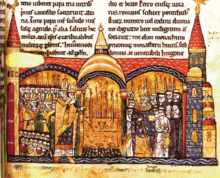Sanctification
A consecration (from the Germanic weiha-, "holy, consecrated, numinos") is a religious ceremony that can refer to people or things.
Consecrated in the ancient religions and nature cults were people with a special religious vocation - (shamans, priests, prophets, kings). The Catholic, Orthodox and Anglican churches know the sacrament of ordination (bishop, priest and deacon ordination), the Christian community the sacrament of priestly ordination.
The Latin language distinguishes between ordinatio (sacrament of consecration), consecratio (consecration), benedictio (blessing) and dedicatio (dedication). The rendering of these terms in German by consecration or blessing is to some extent inconsistent in ecclesiastical texts and in linguistic usage.
What these terms have in common is that a grace is to be conveyed through sign-like actions and usually the saying of a prayer of consecration. Consecration means that the consecrated person is no longer intended for normal, profane "use" in the future and in the long term, but for a different, religious and symbolic-symbolic use. Someone or something is withdrawn from worldly "use" and placed in the sole service of God. But also everyday blessings such as the sprinkling with holy water (cf. Asperges) are supposed to have the effect that the life of this person or the normal, profane use of the object is under the blessing of God.
Ordination is, in the above-mentioned Churches, the consecration and permanent commissioning to the ministry of bishop, priest or deacon, and according to the doctrine of the said Churches, a sacrament. The consecration of a virgin, which is a consecration, and the benediction of an abbot or abbess are sacramentals.
Places or things can be blessed, such as the consecration of churches, altars, flags, bells and candles, blessing of houses, blessing of meals and the blessing of animals. Certain times (the Triduum Sacrum, Holy Week, or "Christmas") and certain places (churches, shrines) are also called "consecrated." Roman Catholic canon law, renewed in 1983, uses the Latin dedicare (literally, 'to hand over, dedicate') for 'consecrate', whereas the Codex Iuris Canonici, previously in force (since 1917), spoke of consecrare (literally, 'to sanctify, make holy'). The 1983 Canon Law now uses consecrare only in relation to people (ordination to the priesthood, religious vows).
The term inauguration refers in particular to the ceremonial form of handing over a building to the public.

Consecration of Cluny by Pope Urban II.
See also
- Patrocinium
- Inauguration
- Sanctification
- Anointing
Search within the encyclopedia